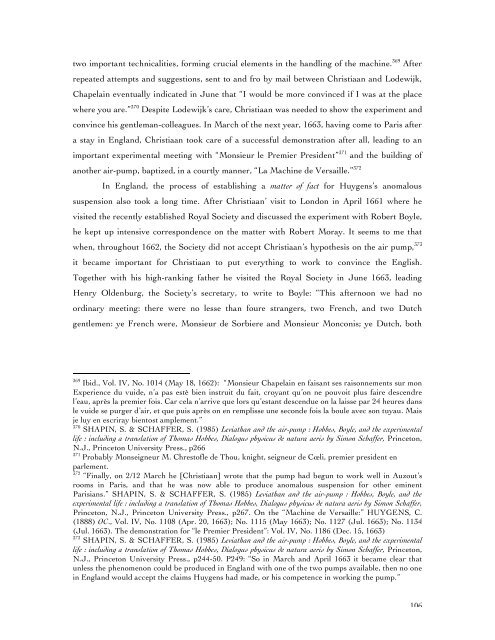Christiaan Huygens – A family affair - Proeven van Vroeger
Christiaan Huygens – A family affair - Proeven van Vroeger
Christiaan Huygens – A family affair - Proeven van Vroeger
Create successful ePaper yourself
Turn your PDF publications into a flip-book with our unique Google optimized e-Paper software.
two important technicalities, forming crucial elements in the handling of the machine. 369 After<br />
repeated attempts and suggestions, sent to and fro by mail between <strong>Christiaan</strong> and Lodewijk,<br />
Chapelain eventually indicated in June that “I would be more convinced if I was at the place<br />
where you are.” 370 Despite Lodewijk’s care, <strong>Christiaan</strong> was needed to show the experiment and<br />
convince his gentleman-colleagues. In March of the next year, 1663, having come to Paris after<br />
a stay in England, <strong>Christiaan</strong> took care of a successful demonstration after all, leading to an<br />
important experimental meeting with “Monsieur le Premier President” 371 and the building of<br />
another air-pump, baptized, in a courtly manner, “La Machine de Versaille.” 372<br />
In England, the process of establishing a matter of fact for <strong>Huygens</strong>’s anomalous<br />
suspension also took a long time. After <strong>Christiaan</strong>’ visit to London in April 1661 where he<br />
visited the recently established Royal Society and discussed the experiment with Robert Boyle,<br />
he kept up intensive correspondence on the matter with Robert Moray. It seems to me that<br />
when, throughout 1662, the Society did not accept <strong>Christiaan</strong>’s hypothesis on the air pump, 373<br />
it became important for <strong>Christiaan</strong> to put everything to work to convince the English.<br />
Together with his high-ranking father he visited the Royal Society in June 1663, leading<br />
Henry Oldenburg, the Society’s secretary, to write to Boyle: “This afternoon we had no<br />
ordinary meeting: there were no lesse than foure strangers, two French, and two Dutch<br />
gentlemen: ye French were, Monsieur de Sorbiere and Monsieur Monconis; ye Dutch, both<br />
369<br />
Ibid., Vol. IV, No. 1014 (May 18, 1662): “Monsieur Chapelain en faisant ses raisonnements sur mon<br />
Experience du vuide, n’a pas estè bien instruit du fait, croyant qu’on ne pouvoit plus faire descendre<br />
l’eau, après la premier fois. Car cela n’arrive que lors qu’estant descendue on la laisse par 24 heures dans<br />
le vuide se purger d’air, et que puis après on en remplisse une seconde fois la boule avec son tuyau. Mais<br />
je luy en escriray bientost amplement.”<br />
370<br />
SHAPIN, S. & SCHAFFER, S. (1985) Leviathan and the air-pump : Hobbes, Boyle, and the experimental<br />
life : including a translation of Thomas Hobbes, Dialogus physicus de natura aeris by Simon Schaffer, Princeton,<br />
N.J., Princeton University Press., p266<br />
371<br />
Probably Monseigneur M. Chrestofle de Thou, knight, seigneur de Cœli, premier president en<br />
parlement.<br />
372<br />
“Finally, on 2/12 March he [<strong>Christiaan</strong>] wrote that the pump had begun to work well in Auzout’s<br />
rooms in Paris, and that he was now able to produce anomalous suspension for other eminent<br />
Parisians.” SHAPIN, S. & SCHAFFER, S. (1985) Leviathan and the air-pump : Hobbes, Boyle, and the<br />
experimental life : including a translation of Thomas Hobbes, Dialogus physicus de natura aeris by Simon Schaffer,<br />
Princeton, N.J., Princeton University Press., p267. On the “Machine de Versaille:” HUYGENS, C.<br />
(1888) OC., Vol. IV, No. 1108 (Apr. 20, 1663); No. 1115 (May 1663); No. 1127 (Jul. 1663); No. 1134<br />
(Jul. 1663). The demonstration for “le Premier President”: Vol. IV, No. 1186 (Dec. 15, 1663)<br />
373<br />
SHAPIN, S. & SCHAFFER, S. (1985) Leviathan and the air-pump : Hobbes, Boyle, and the experimental<br />
life : including a translation of Thomas Hobbes, Dialogus physicus de natura aeris by Simon Schaffer, Princeton,<br />
N.J., Princeton University Press., p244-50. P249: “So in March and April 1663 it became clear that<br />
unless the phenomenon could be produced in England with one of the two pumps available, then no one<br />
in England would accept the claims <strong>Huygens</strong> had made, or his competence in working the pump.”<br />
106


